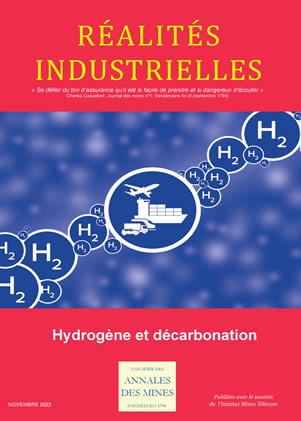| |

|
|
 Novembre 2022 - Hydrogène et décarbonation Novembre 2022 - Hydrogène et décarbonation
L’hydrogène décarboné : une stratégie interministérielle et une gouvernance rénovée
Par Hoang BUI
Secrétariat général pour l’investissement, sous l’autorité du Premier ministre
La France a construit une stratégie Hydrogène qui doit garantir son indépendance. Au travers de cette stratégie qu’elle a dotée de moyens financiers substantiels (8,9 Mds€), elle vise à produire son hydrogène par électrolyse et accélérer le déploiement de sa décarbonation, tout en portant une ambition industrielle d’envergure mondiale. Elle fait ainsi la course dans le peloton de tête.
À la sortie de la crise sanitaire, les services de l’État se sont mis en ordre de bataille et ont adopté une nouvelle gouvernance, où ils travaillent systématiquement en interministériel ‒ un travail à la base des plans d’investissement France Relance, puis France 2030 ‒ et en interaction permanente avec les acteurs privés, au travers notamment du Conseil national de l’hydrogène. La crise du gaz a renforcé encore plus la conviction collective qu’il faut sortir en urgence de notre dépendance aux hydrocarbures fossiles, et ce grâce à l’hydrogène et à nos énergies décarbonées.
Mais la route est encore longue et pavée d’embûches. L’hydrogène est-il toujours la meilleure solution ? Nous sommes-nous lancés trop tôt dans l’électrolyse ? S’agit-il d’un investissement sans regret ? Disposerons-nous d’assez d’électricité et d’équipements « Made in France » pour installer 6,5 GW de capacités d’électrolyse d’ici à 2030 ? Réussirons-nous, grâce à ce déploiement massif, à faire baisser le coût de l’hydrogène décarboné produit ? Pour ce faire, pouvons-nous compter sur l’innovation, l’augmentation de la puissance et des performances des électrolyseurs et la construction de gigafactories d’équipements grâce au soutien financier exceptionnel apporté dans le cadre du programme européen IPCEI, avec pour but d’accompagner le dynamisme de nos industriels ?
Quand nos voisins, l’Espagne ou l’Allemagne, nous pressent d’investir dans des infrastructures de transport d’hydrogène par pipeline, avons-nous raison de dire non en raison des coûts échoués, et ce même si de grands industriels nous le demandent ? Et si la vraie question, c’était plutôt : quand ? C’est-à-dire quand devrions-nous réexaminer la question des infrastructures qui pourraient être nécessaires pour le développement de nos propres bassins d’hydrogène ? L’Allemagne, qui doit importer massivement de l’hydrogène vert, va-t-elle déstabiliser la production européenne locale, et surtout française ? Quels seront le prix de cet hydrogène liquéfié (ou ammoniac) importé via les terminaux de l’Europe du Nord et le coût de sa distribution ? Comment retrouver nos repères économiques alors que le prix de l’électricité, qui représentait jusqu’à présent 70 % du coût de l’hydrogène décarboné produit, a été multiplié par presque 9 (en juillet 2022 par rapport à fin 2020) et que celui du gaz naturel a été multiplié par 6 ?
Et si le plus important, c’était l’équipage ? Notre capacité à nous écouter les uns les autres, à comprendre l’environnement qui nous entoure et les évolutions économiques et techniques pour réajuster en permanence, ensemble, notre route ? Mais aussi notre capacité à savoir changer de cap quand le chemin tracé nous mène à une impasse.
 Télécharger gratuitement l'article Télécharger gratuitement l'article
 Retour au sommaire Retour au sommaire
 November 2022 - Hydrogen and decarbonation November 2022 - Hydrogen and decarbonation
Decarbonated hydrogen: an interministerial strategy and renewed governance
Hoang Bui,
General Secretariat for Investment, under the authority of the Prime Minister
France has built a Hydrogen strategy to guarantee its independence. Through this strategy, which it has endowed with substantial financial resources (€8.9 billion), it aims to produce its own hydrogen by electrolysis and accelerate the deployment of its decarbonization, while at the same time pursuing a global industrial ambition. It is thus racing in the leading pack.
After the health crisis, the State’s departments got down to work and adopted a new form of governance, in which they systematically work in interministerial cooperation ‒ a work that is the basis of the France Relance and France 2030 investment plans ‒ and in permanent interaction with private players, notably through the National Hydrogen Council. The gas crisis has further strengthened our collective conviction that we must urgently break our dependence on fossil fuels, thanks to hydrogen and our decarbonized energies.
But the road is still long and paved with pitfalls. Is hydrogen always the best solution? Did we launch ourselves too early into electrolysis? Is it a no-regrets investment? Will we have enough electricity and ‟Made in France” equipment to install 6.5 GW of electrolysis capacity by 2030? Will we succeed, thanks to this massive deployment, in lowering the cost of decarbonated hydrogen produced? To do this, can we count on innovation, increasing the power and performance of electrolysers and building gigafactories of equipment thanks to the exceptional financial support provided under the European IPCEI program, with the aim of supporting the dynamism of our industrialists?
When our neighbors, Spain or Germany, urge us to invest in hydrogen transport infrastructures by pipeline, are we right to say no because of the stranded costs, even if major industrialists ask us to do so? What if the real question is when? That is, when should we revisit the question of what infrastructure might be needed to develop our own hydrogen pools? Will Germany, which has to import green hydrogen on a massive scale, destabilize local, and especially French, European production? What will be the price of this liquefied hydrogen (or ammonia) imported via Northern European terminals and the cost of its distribution? How can we find our economic reference points when the price of electricity, which until now represented 70% of the cost of the decarbonized hydrogen produced, has been multiplied by almost 9 (July 2022 compared to the end of 2020) and that of natural gas has been multiplied by 6?
What if the most important thing was the crew? Our ability to listen to each other, to understand the environment around us and the economic and technical developments to constantly readjust our course together? But also our ability to know how to change course when the path we have chosen leads us to a dead end.
 Retour au sommaire Retour au sommaire
|
|




